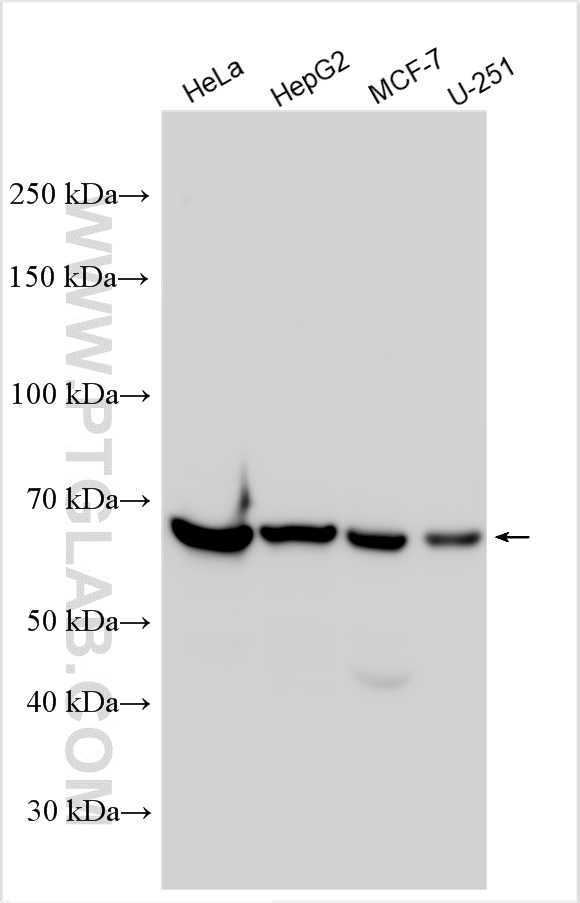验证数据展示
经过测试的应用
| Positive WB detected in | HeLa cells, HepG2 cells, MCF-7 cells, U-251 cells |
推荐稀释比
| 应用 | 推荐稀释比 |
|---|---|
| Western Blot (WB) | WB : 1:500-1:2000 |
| It is recommended that this reagent should be titrated in each testing system to obtain optimal results. | |
| Sample-dependent, Check data in validation data gallery. | |
产品信息
13819-1-AP targets TKTL1 in WB, ELISA applications and shows reactivity with human samples.
| 经测试应用 | WB, ELISA Application Description |
| 经测试反应性 | human |
| 免疫原 | TKTL1 fusion protein Ag4913 种属同源性预测 |
| 宿主/亚型 | Rabbit / IgG |
| 抗体类别 | Polyclonal |
| 产品类型 | Antibody |
| 全称 | transketolase-like 1 |
| 别名 | TK 2, TKR, TKT2, TKTL1, Transketolase 2, transketolase like 1, Transketolase like protein 1, Transketolase related protein |
| 计算分子量 | 65 kDa |
| 观测分子量 | 65 kDa |
| GenBank蛋白编号 | BC025382 |
| 基因名称 | TKTL1 |
| Gene ID (NCBI) | 8277 |
| RRID | AB_3085424 |
| 偶联类型 | Unconjugated |
| 形式 | Liquid |
| 纯化方式 | Antigen affinity purification |
| UNIPROT ID | P51854 |
| 储存缓冲液 | PBS with 0.02% sodium azide and 50% glycerol , pH 7.3 |
| 储存条件 | Store at -20°C. Stable for one year after shipment. Aliquoting is unnecessary for -20oC storage. |
背景介绍
Transketolase (TKT) is an enzyme that is ubiquitously expressed in all living organisms and has been identified as an important regulator of cancer. The TKT family includes the TKT gene and two TKT-like (TKTL) genes; TKTL1 and TKTL2.The basic components ribose-5-phosphate and acetyl-CoA, which are formed by TKTL1, provide essential building blocks for the formation of new cells. TKTL1 also allows survival in the absence of oxygen (hypoxia).TKTL1 also has been shown to be involved in regulating neuronal development in the cerebral cortex.
实验方案
| Product Specific Protocols | |
|---|---|
| WB protocol for TKTL1 antibody 13819-1-AP | Download protocol |
| Standard Protocols | |
|---|---|
| Click here to view our Standard Protocols |
